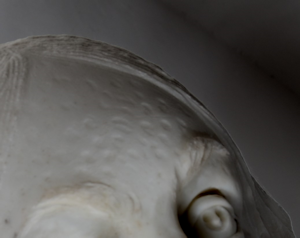
A second stage of RTI recording was carried out in order to establish the depth of the suspected pock-marks. Figure 15 illustrates the results from this stage of analysis.

By now it is possible to see that the marks appear definitely to be a network of cavities. Moreover they are quite crudely punched and are of differing depths. In addition to this they appear predominantly to be angled upwards as though a mason was deliberately striking them onto the surface of the effigy from below. This begins to indicate that the effigy was already in situ when the marks were made rather than created in a studio, and this in turn could suggest that they were a secondary treatment.
Internet Archaeology is an open access journal based in the Department of Archaeology, University of York. Except where otherwise noted, content from this work may be used under the terms of the Creative Commons Attribution 3.0 (CC BY) Unported licence, which permits unrestricted use, distribution, and reproduction in any medium, provided that attribution to the author(s), the title of the work, the Internet Archaeology journal and the relevant URL/DOI are given.
Terms and Conditions | Legal Statements | Privacy Policy | Cookies Policy | Citing Internet Archaeology
Internet Archaeology content is preserved for the long term with the Archaeology Data Service. Help sustain and support open access publication by donating to our Open Access Archaeology Fund.